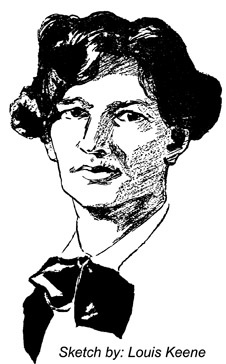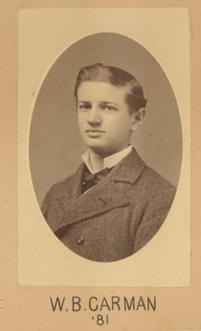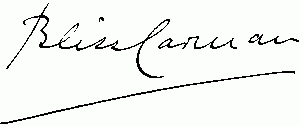1861-1929


Canadian poet, literary journalist and editor. Born in Fredericton, New Brunswick, Carman was a cousin of Sir Charles G.D. Roberts, the poet and fiction writer. Both were edcuated at the University of New Brunswick. Carman later pursued his education in Edinburgh and at Harvard and settled permanently in New England in the 1890s. He was elected to the Royal Society of Canada in 1925 and in 1928 was awarded the Lorne Pierce Medal for distinguished service to literature. He edited the Oxford Book of American Verse in 1927. The medal of the Poetry Society of America was awarded posthumously. Carman's work was influenced by Poe, Emerson and Whitman, and by his long association with the trancendentalist movement of New England. His style has been described as having a quality of "vague mysticism" suited to the nature lyric; he has been called "the poet of the open road."1 "He provides, and this is the secret of his early popularity, a pattern of response to nature which almost any reader ... can experience."2 Carman was a very prolific writer and a popular one; his first collection was Low Tide on Grand Pré (1893) and he continued to publish right up until his death. Whalen remarks that Carman was seen as "a cultural hero" in Canada, and in the mid-1920s, was known as the "unofficial poet laureate of the nation."3 Three collections of his poetry appeared posthumously in 1931.
Bliss Carman's entry in The New Brunswick Literary Encyclopedia

- Main Page
- Anniversaries
- Brief History of UNB
- Buildings
- Faculties and Departments
- Governance and Administrative Positions
- Lecture Series
- Official University Events and Symbols
- People of UNB
- Plaques, Monuments and Structures
- Prizes and Awards
- Sports and Athletics
- Student Clubs and Societies
- Student Events and Escapades
- University Publications
- Women's Sports at UNB
- About UNB Archives and Special Collections
Request an Appointment
Prior arrangements must be made for the retrieval of this material. Please email archives@unb.ca to make an appointment.
Procedures
Help Desk Hours
- Monday - Friday
- 10:00 am - 12:00 pm
- 1:00 pm - 4:00 pm
Contact Us
- 5th Floor, Harriet Irving Library
- University of New Brunswick
- 5 Macaulay Lane, Box 7500
- Fredericton, NB E3B 5H5 Canada
- archives@unb.ca
- Staff Directory